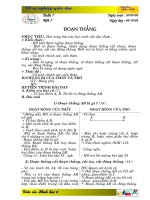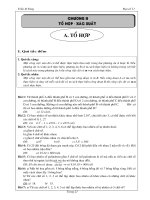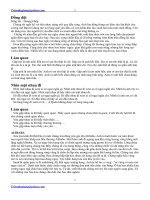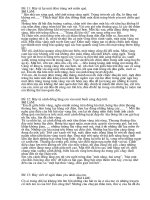Water-Boiler-Presentation hay của nalco
Bạn đang xem bản rút gọn của tài liệu. Xem và tải ngay bản đầy đủ của tài liệu tại đây (10.47 MB, 42 trang )
1
Boiler Water Chemical
Treatment
Agenda
Nalco
Introduction
General
Water Chemistry Overview
Boiler
Internal Training
Quick
checks for Plant Visit
Plant
Visit Update
Questions?
2
3
BOILER WATER TREATMENT
GENERAL WATER CHEMISTRY
4
Why Use Water for Heating?
5
Why Use Water for Heating?
Abundant
Available
Inexpensive
Safe
High Specific Heat
6
Why Isn’t Water Perfect for Heating?
7
Why Isn’t Water Perfect for Heating?
Dissolved Solids
Dissolved Gases
Suspended Matter
8
THE HYDROLOGIC CYCLE
Rain
Precipitation
Soil
Vegetation
(Evapotranspiration)
Ponds and Lakes
Rivers
Ocean
Heating Water Systems
Overview
SURFACE WATER
Lower in dissolved solids
Higher in suspended solids
Quality changes quickly with seasons and weather
GROUND WATER
Higher in dissolved solids and Lower in suspended solids
Higher in iron and manganese
Low in oxygen, may contain sulfide gas
Relatively constant quality and temperature
9
10
BOILER INTERNAL TREATMENT
11
Boiler Treatment
Alkalinity
Adjunct
Steam Line
Treatment
Steam
Softener
Deaerator
Condensate Receiver
Oxygen
Scavenger
Boiler
Internal
Treatment
Blowdown
12
Purpose of Internal Treatment
Inhibit
formation of mineral scales
Inhibit
deposition of iron particles
Maintain
efficient heat transfer
Maintain
equipment integrity
Maintain
steam generation capability
Lengthen
time between or eliminate boiler cleanings
Our goal is a 100% reliable and safe source of steam
13
How Do We Prevent This?
14
What control parameters should we be concerned with?
Neutralized
Conductivity
“O” Alkalinity
Sulfite
Silica
residual
(If you have high Silica Make-Up)
Hardness
Internal
Treatment Residuals
15
Neutralized Conductivity
Elevated
TDS
Boiler carryover
Hardness or Silica Scaling due to higher mineral
content, this also can lead to elevated Stack Temps
Potential Deposition of iron and other foulants
Depressed
TDS
Increased chemical usage
Increased water usage
Increased corrosion potential in the boiler due to
lower alkalinity/pH due to low cycles
16
Sulfite
High
Sulfite
Wasted product due to overfeed
Potential elevated corrosion rates in feedwater tank
due to suppressed pH (Catalyzed Sulfite)
Low
Sulfite
Increased corrosion potential due to presence of
oxygen in FW due to low sulfite levels
During offline “stand-by” operation lower sulfite
levels can also lead to increased oxygen corrosion
potential in internal boiler
17
Hardness
High
Hardness
Internal boiler scaling from high hardness
Scaling reduces boiler heat transfer efficiency
(excessive fuel usage)
Scale leads to uneven heating of heat transfer
surfaces and premature boiler tube failures
18
What Causes Problems with Internal Treatment?
Mechanical
Hardness
TDS
Carryover
Intrusion in Feedwater
induced Carryover
19
What causes Mechanical Carryover?
Malfunctioning
Improper
Wide
steam separation equipment
Level Control
load fluctuations
20
What are other causes of Carryover?
High TDS
in Boiler
This can lead to severe scaling potential or deposition of
incoming minerals such as Silica, Calcium, Magnesium,
and iron.
Elevated
chemical levels can lead to carryover and foaming
/> />
21
CONDENSATE SYSTEM OPERATION AND
TROUBLESHOOTING
22
After Boiler Treatment
Alkalinity
Adjunct
Steam Line
Treatment
Steam
oftener
Deaerator
Condensate Receiver
Oxygen
Scavenger
Boiler
Internal
Treatment
Blowdown
Value/Benefit of Condensate
Increased
condensate return means increased thermal
efficiency.
Increased
condensate return means higher boiler
cycles.
Increased
condensate return means lower chemical
usage.
Increased
condensate return, and better treatment,
means longer equipment life.
23
24
Why Treat Condensate Systems?
"A typical 100 psi boiler system producing 8,000
pounds steam/hour may save up to $10,000/year in
energy, water, and chemicals by increasing their
condensate return 10%."
25
How Do We Prevent This?









